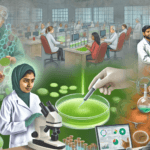Discover the latest biotech startups transforming the medical industry with groundbreaking innovations. Learn how they’re revolutionizing medicine.
Emerging Biotech Startups Revolutionizing Medicine

Table of Contents
“Transforming healthcare through innovation and cutting-edge technology.”
Introduction
Emerging biotech startups are revolutionizing the field of medicine with their innovative approaches and cutting-edge technologies. These startups are disrupting traditional methods of healthcare and are paving the way for a more personalized and efficient approach to treating diseases and improving overall health. With a focus on research and development, these startups are pushing the boundaries of what is possible in the medical field and are bringing hope to patients and healthcare professionals alike. In this rapidly evolving industry, these biotech startups are playing a crucial role in shaping the future of medicine and transforming the way we think about healthcare.
Gene Editing: The Future of Precision Medicine
Gene editing, also known as genome editing, is a revolutionary technology that has the potential to transform the field of medicine. It involves making precise changes to the DNA of an organism, allowing for the correction of genetic mutations and the creation of new traits. This technology has been around for decades, but recent advancements have made it more accessible and efficient, leading to a surge in biotech startups focused on gene editing.
One of the main reasons for the growing interest in gene editing is its potential to treat and cure genetic diseases. These are conditions caused by mutations in a person’s DNA, and they can range from rare disorders to more common diseases like cancer and diabetes. Traditional treatments for genetic diseases often involve managing symptoms, but gene editing offers the possibility of a permanent cure by correcting the underlying genetic mutation.
One of the most well-known gene editing techniques is CRISPR-Cas9, which stands for Clustered Regularly Interspaced Short Palindromic Repeats-CRISPR associated protein 9. This technique uses a guide RNA to target a specific sequence of DNA and then uses the Cas9 protein to make precise cuts in the DNA. These cuts can then be repaired by the cell’s natural DNA repair mechanisms, resulting in the desired genetic change.
The potential of CRISPR-Cas9 has attracted a lot of attention from both the scientific community and the business world. In fact, several biotech startups have been founded with the goal of harnessing this technology for medical purposes. One such company is Editas Medicine, which was founded in 2013 and has since raised over $200 million in funding. Their focus is on developing gene editing therapies for a range of genetic diseases, including rare disorders like sickle cell disease and more common conditions like cystic fibrosis.
Another startup making waves in the gene editing field is Intellia Therapeutics. Founded in 2014, this company has raised over $200 million and is also focused on developing treatments for genetic diseases. They are currently working on a therapy for transthyretin amyloidosis, a rare condition that causes the buildup of abnormal proteins in the body’s organs. By using CRISPR-Cas9 to correct the genetic mutation responsible for this disease, Intellia hopes to provide a long-term solution for patients.
While gene editing has shown great promise in treating genetic diseases, it also has the potential to revolutionize other areas of medicine. For example, it could be used to create more effective and targeted cancer treatments. By editing the genes of cancer cells, researchers could make them more susceptible to existing treatments or even create new therapies that specifically target the mutated genes driving the cancer.
Additionally, gene editing could also be used to enhance the effectiveness of vaccines. By editing the genes of viruses, scientists could create weakened versions that can still trigger an immune response but are less likely to cause harm. This could lead to more effective and safer vaccines for diseases like influenza and HIV.
However, with all the potential benefits of gene editing, there are also ethical concerns that must be addressed. One of the main concerns is the possibility of unintended consequences. While CRISPR-Cas9 is highly precise, there is still a risk of off-target effects, where the gene editing tool makes changes in unintended locations in the DNA. This could potentially lead to new diseases or other unforeseen consequences.
In conclusion, gene editing has the potential to revolutionize medicine and improve the lives of millions of people. Biotech startups focused on this technology are at the forefront of this revolution, and their work could lead to groundbreaking treatments for genetic diseases and other medical conditions. However, it is important to proceed with caution and address ethical concerns to ensure the safe and responsible use of this powerful technology.
Revolutionizing Drug Delivery: Nanotechnology in Biotech Startups

The field of biotechnology has been rapidly evolving in recent years, with new startups emerging and revolutionizing the way medicine is delivered. One of the most promising areas of innovation is the use of nanotechnology in drug delivery. This cutting-edge technology has the potential to greatly improve the effectiveness and efficiency of drug delivery, leading to better treatment outcomes for patients.
Nanotechnology involves the manipulation of materials at the nanoscale, which is on the order of one billionth of a meter. This allows for precise control and targeting of drug delivery, as well as the ability to overcome biological barriers that may hinder traditional drug delivery methods. Biotech startups are harnessing the power of nanotechnology to develop novel drug delivery systems that have the potential to transform the way we treat diseases.
One such startup is Nanobiotix, a French company that is using nanotechnology to enhance the effectiveness of radiation therapy for cancer treatment. Their product, called NBTXR3, is a nanoparticle that is injected directly into the tumor. When exposed to radiation, the nanoparticles heat up and destroy the cancer cells, while sparing the surrounding healthy tissue. This targeted approach not only increases the effectiveness of the treatment, but also reduces side effects for patients.
Another startup, Nanospectra Biosciences, is using nanotechnology to target and destroy cancer cells using a different approach. Their product, called AuroLase, consists of gold nanoparticles that are injected into the tumor. When exposed to a specific type of light, the nanoparticles heat up and destroy the cancer cells. This method has the potential to be used for a wide range of cancers and has shown promising results in clinical trials.
In addition to improving the effectiveness of cancer treatment, nanotechnology is also being used to develop new treatments for other diseases. For example, biotech startup Cerulean Pharma is using nanotechnology to deliver chemotherapy drugs directly to tumors. Their product, called CRLX101, consists of nanoparticles that are designed to release the drug in a controlled manner, targeting the tumor and reducing side effects for patients.
Nanotechnology is also being used to improve the delivery of gene therapy, a promising treatment for genetic diseases. Biotech startup GenSight Biologics is using nanotechnology to deliver gene therapy directly to the retina for the treatment of inherited retinal diseases. Their product, called GS030, consists of nanoparticles that are injected into the eye and deliver the gene therapy to the specific cells that need it. This targeted approach has the potential to greatly improve the effectiveness of gene therapy and could lead to new treatments for a wide range of genetic diseases.
In addition to improving the delivery of traditional drugs, nanotechnology is also being used to develop new types of drugs. Biotech startup Selecta Biosciences is using nanotechnology to create synthetic vaccines that can be targeted to specific cells in the body. Their product, called ImmTOR, consists of nanoparticles that are designed to mimic the body’s natural immune response. This technology has the potential to greatly improve the effectiveness of vaccines and could lead to new treatments for diseases such as cancer and autoimmune disorders.
The use of nanotechnology in drug delivery is still in its early stages, but the potential for revolutionizing medicine is immense. Biotech startups are at the forefront of this innovation, developing novel treatments that have the potential to greatly improve patient outcomes. As this technology continues to advance, we can expect to see even more groundbreaking treatments emerge, leading to a brighter future for healthcare.
The Rise of Digital Health: How Biotech Startups are Transforming Healthcare
The healthcare industry has seen a significant transformation in recent years, thanks to the rise of digital health and the emergence of biotech startups. These startups are revolutionizing medicine by leveraging technology and innovation to improve patient outcomes, increase efficiency, and reduce costs.
One of the key areas where biotech startups are making a significant impact is in the development of personalized medicine. This approach to healthcare involves tailoring treatments to an individual’s unique genetic makeup, lifestyle, and environment. By using advanced technologies such as genomics, proteomics, and bioinformatics, biotech startups are able to analyze vast amounts of data and identify personalized treatment options for patients.
This personalized approach to medicine has the potential to revolutionize the way we treat diseases. Instead of a one-size-fits-all approach, patients can receive treatments that are specifically tailored to their needs, resulting in better outcomes and fewer side effects. Biotech startups are also working on developing companion diagnostics, which are tests that can identify which patients will respond best to a particular treatment. This not only improves patient outcomes but also reduces the risk of adverse reactions and unnecessary treatments.
Another area where biotech startups are making a significant impact is in the development of digital therapeutics. These are software-based treatments that use digital technologies such as mobile apps, virtual reality, and artificial intelligence to prevent, manage, or treat medical conditions. Digital therapeutics have the potential to transform the way we approach chronic diseases such as diabetes, hypertension, and mental health disorders. By providing patients with personalized, accessible, and cost-effective treatments, digital therapeutics have the potential to improve patient outcomes and reduce the burden on healthcare systems.
In addition to personalized medicine and digital therapeutics, biotech startups are also revolutionizing drug discovery and development. Traditionally, the process of bringing a new drug to market can take up to 15 years and cost billions of dollars. However, biotech startups are using innovative technologies such as machine learning, artificial intelligence, and high-throughput screening to accelerate the drug discovery process. This not only reduces the time and cost of bringing new drugs to market but also increases the chances of success.
Moreover, biotech startups are also developing new treatments for rare and orphan diseases, which have traditionally been neglected by larger pharmaceutical companies due to the small market size. By leveraging innovative technologies and approaches, biotech startups are able to develop treatments for these diseases that were previously thought to be untreatable. This not only provides hope for patients and their families but also creates new opportunities for the biotech industry.
The rise of biotech startups has also led to a democratization of healthcare. With the increasing availability of digital health tools and platforms, patients are now able to take a more active role in managing their health. This includes using wearable devices to track their health data, accessing telemedicine services for remote consultations, and using mobile apps to monitor their medication adherence. By empowering patients to take control of their health, biotech startups are helping to shift the focus of healthcare from treatment to prevention.
In conclusion, biotech startups are revolutionizing medicine by leveraging technology and innovation to improve patient outcomes, increase efficiency, and reduce costs. From personalized medicine and digital therapeutics to drug discovery and development, these startups are transforming the healthcare industry and providing hope for patients and their families. As the digital health revolution continues to gain momentum, we can expect to see even more groundbreaking advancements from biotech startups in the years to come.
From Lab to Market: How Biotech Startups are Accelerating Drug Development
The field of biotechnology has been rapidly growing in recent years, with new advancements and breakthroughs being made every day. One of the most exciting aspects of this growth is the emergence of biotech startups, which are revolutionizing the way medicine is developed and brought to market. These startups are utilizing cutting-edge technology and innovative approaches to accelerate the drug development process, ultimately bringing life-saving treatments to patients faster than ever before.
One of the key ways in which biotech startups are revolutionizing medicine is through their use of artificial intelligence (AI) and machine learning. These technologies have the ability to analyze vast amounts of data and identify patterns that would be nearly impossible for humans to detect. This allows for more efficient and accurate drug discovery, as well as the identification of potential side effects or interactions.
In addition to AI and machine learning, biotech startups are also utilizing other advanced technologies such as gene editing and 3D printing. These technologies have the potential to completely transform the way drugs are developed and manufactured. For example, gene editing allows for precise modifications to be made to a cell’s DNA, potentially curing genetic diseases or making existing treatments more effective. 3D printing, on the other hand, can be used to create personalized medications tailored to an individual’s specific needs.
Another way in which biotech startups are accelerating drug development is through their use of collaboration and partnerships. These startups often work closely with academic institutions, research organizations, and larger pharmaceutical companies to share resources and expertise. This allows for a more streamlined and efficient drug development process, as well as access to a wider range of resources and knowledge.
Furthermore, biotech startups are also disrupting the traditional drug development model by focusing on rare and neglected diseases. These startups are tackling diseases that have been historically overlooked by larger pharmaceutical companies due to their smaller patient populations and lower profit potential. By focusing on these diseases, biotech startups are not only bringing much-needed treatments to those who need them, but they are also paving the way for future advancements in these areas.
In addition to their impact on drug development, biotech startups are also revolutionizing the way drugs are brought to market. Traditionally, the drug approval process can take years and cost millions of dollars. However, biotech startups are utilizing innovative approaches such as adaptive clinical trials and real-world evidence to speed up this process. Adaptive clinical trials allow for changes to be made to the trial design as new data becomes available, resulting in a more efficient and effective process. Real-world evidence, on the other hand, utilizes data from sources such as electronic health records and patient registries to supplement traditional clinical trial data, providing a more comprehensive understanding of a drug’s safety and effectiveness.
The impact of biotech startups on medicine is not limited to drug development and approval. These startups are also disrupting the traditional healthcare model by focusing on preventative and personalized medicine. By utilizing technologies such as genetic testing and wearable devices, biotech startups are able to identify potential health risks and tailor treatments to an individual’s specific genetic makeup and lifestyle. This not only leads to better health outcomes for patients but also has the potential to reduce healthcare costs in the long run.
In conclusion, biotech startups are revolutionizing medicine in numerous ways. From their use of advanced technologies to their focus on collaboration and partnerships, these startups are accelerating the drug development process and bringing life-saving treatments to patients faster than ever before. As the field of biotechnology continues to grow and evolve, the impact of these startups will only continue to expand, ultimately leading to a healthier and more advanced society.
Q&A
1. What are some examples of emerging biotech startups revolutionizing medicine?
Some examples of emerging biotech startups revolutionizing medicine include Moderna, which developed a groundbreaking mRNA vaccine for COVID-19, and 23andMe, which offers personalized genetic testing and health reports. Other startups like Grail and Guardant Health are using liquid biopsies to detect cancer at an early stage, while companies like Insitro and Recursion Pharmaceuticals are using artificial intelligence and machine learning to accelerate drug discovery and development.
2. How are these startups changing the landscape of medicine?
These startups are changing the landscape of medicine by introducing innovative technologies and approaches to healthcare. They are disrupting traditional methods of drug development and diagnosis, making it faster, more accurate, and more personalized. These startups are also driving down costs and increasing accessibility to healthcare, making it more accessible to a wider population.
3. What impact do these startups have on patients?
These startups have a significant impact on patients by providing them with more effective and personalized treatments. With the use of advanced technologies, these startups are able to develop treatments that target specific genetic mutations or diseases, leading to better outcomes for patients. They also offer patients more control over their health by providing them with access to their genetic information and empowering them to make informed decisions about their healthcare.
4. What challenges do these startups face in the biotech industry?
Some challenges that these startups face in the biotech industry include high costs of research and development, strict regulations and approval processes, and competition from established pharmaceutical companies. Additionally, there may be ethical concerns surrounding the use of genetic information and AI in healthcare. These startups also face the challenge of securing funding and attracting top talent in a highly competitive market.
Conclusion
In conclusion, emerging biotech startups are revolutionizing medicine by bringing innovative technologies and treatments to the healthcare industry. These startups are disrupting traditional methods and introducing new solutions for diseases and conditions that were previously considered incurable. With their focus on precision medicine and personalized treatments, these startups are paving the way for a more efficient and effective healthcare system. Additionally, their use of advanced technologies such as AI, genomics, and biotechnology is accelerating the pace of medical advancements and improving patient outcomes. As these startups continue to grow and gain recognition, they have the potential to greatly impact the future of medicine and improve the overall quality of life for individuals around the world.








